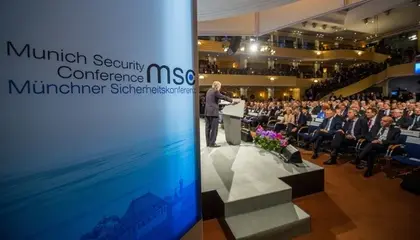The overwhelming majority of Ukrainians (93%) called the complete withdrawal of Russian troops from the territory of Ukraine, including Crimea, as acceptable conditions for a ceasefire, these are the results of a survey conducted at the end of November by the Munich Security Conference (MSC) and Kekst CNC.
“Even a Russian withdrawal from previously occupied areas would be unacceptable for the majority of Ukrainians if it does not also include Crimea. Premature peace negotiations, calls for which are particularly vocal in some Western capitals, would thus likely meet fierce resistance among the Ukrainian population,” the annual Munich Security Report says.
JOIN US ON TELEGRAM
Follow our coverage of the war on the @Kyivpost_official.
It is clarified that only 11% of Ukrainians surveyed agreed with such terms of the ceasefire, while 80% called it unacceptable.
The option of returning Russian troops to the line on February 24, 2022 for a ceasefire was approved by 7%, and keeping them in the occupied territories by 1%, while 85% and 97% opposed, respectively.
“Astonishingly, only six percent of Ukrainians feel unprepared to take on Russia’s invasion, and even during a winter marked by blackouts and shortages they feel more prepared to face the risk of energy supply disruption than any G7 public,” Munich Security Index, included in the report, says.
The survey confirmed Ukraine's unequivocal Western orientation. The overwhelming majority of Ukrainians want to live in a world formed according to European rules – 63%, to a lesser extent according to American rules - 22%. Another 2% chose the option "economically developed countries", while the Chinese vision of the order is close to only 1%.

N. Korean Troops Massed in Russia to Enter Ukraine War ’Soon’: Pentagon Chief
It is noted that unlike some Western politicians, whose concerns about further military escalation seem to undermine more resolute support, Ukrainians are not intimidated by threats from Russia. No matter how destructive the use of tactical nuclear weapons against a city or on the battlefield, the overwhelming majority of Ukrainians – about 90% – say they would still refuse to surrender if it happened.
The Munich Security Conference also calls on Ukraine's transatlantic partners to start planning how to ensure Ukraine's long-term security from Russian attacks. Ukrainian citizens are well aware of the ongoing threat posed by Putin's Russia (83% vs. 6%), and the overwhelming majority (75% vs. 8%) believe that they need Western security guarantees, but it is not yet clear what they might look like. The majority of Ukrainians (72% vs. 6%) also believe that they will need constant supplies of weapons from the West.
A clear majority (65% vs. 13%) also fears that Ukraine will never be safe outside of NATO, which is confirmed by the fact that Ukrainians trust the United States more/NATO (63% vs. 5%) is more than the EU in the matter of protection from Russia. (The difference between the sum of the specified votes and 100% – undecided).
The document notes that these models are also reflected in the Ukrainians' assessment of the reaction of other countries to the war. Respondents rate all G7 countries, as well as Turkey, unequivocally positively. But there are significant differences between them, which is not surprising, given the difference in the material support provided, the messages and the urgency with which the countries reacted to the war. The UK tops the rating with an indicator of 77% (the difference between those who rated positively and negatively the reaction to the invasion of the Russian Federation), followed by the USA and Canada (76% and 72%), the states of Western Europe lag behind the English-speaking countries by about 30 percentage points, NATO – by 40 percentage points, although the EU is rated at the level of 61%.
At the same time, Ukrainians believe that China and India reacted particularly badly (-37% and -27%, respectively), but in general, all actors of the "Global South" have negative points in the rating (-13% in South Africa, -7% in Brazil, -1% in Indonesia and -15% on average).
In another question about countries that Ukrainians consider allies or enemies, China and India have a negative balance of answers of 29% and 2%, while Russia and Belarus have 97% and 85% respectively, and Hungary has 13%.
You can also highlight the text and press Ctrl + Enter






